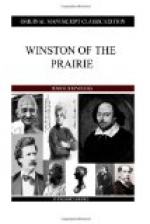There was very little in their appearance to attract the attention of a young woman of Miss Barrington’s upbringing. They had grave bronzed faces, and wore, for the most part, old fur coats stained here and there with soil, and their mittens and moccasins were not in good repair; but there was a curious steadiness in their gaze which vaguely suggested the slow stubborn courage that upheld them through the strenuous effort and grim self-denial of their toilsome lives. They were small wheat-growers who had driven in to purchase provisions or inquire the price of grain, and here and there a mittened hand was raised to a well-worn cap, for most of them recognized Miss Barrington of Silverdale Grange. She returned their greetings graciously, and then swung herself from the platform, with a smile in her eyes, as a man came hastily and yet as it were with a certain deliberation in her direction.
He was elderly, but held himself erect, while his furs, which were good, fitted him in a fashion which suggested a uniform. He also wore boots which reached half-way to the knee, and were presumably lined to resist the prairie cold, which few men at that season would do, and scarcely a speck of dust marred their lustrous exterior, while as much of his face as was visible beneath the great fur cap was lean and commanding. Its salient features were the keen and somewhat imperious gray eyes and long straight nose, while something in the squareness of the man’s shoulders and his pose set him apart from the prairie farmers, and suggested the cavalry officer. He was in fact Colonel Barrington, founder and autocratic ruler of the English community of Silverdale, and he had been awaiting his niece somewhat impatiently. Colonel Barrington was invariably punctual, and resented the fact that the train had come in an hour later than it should have done.
“So you have come back to us. We have been longing for you, my dear,” he said. “I don’t know what we should have done had they kept you in Montreal altogether.”
Maud Barrington smiled, though there was a brightness in her eyes and a faint warmth in her cheek, for the sincerity of her uncle’s welcome was evident.
“Yes,” she said, “I have come back. It was very pleasant in the city, and they were all kind to me, but I think, henceforward, I would sooner stay with you on the prairie.”
Colonel Barrington patted the hand he drew through his arm, and there was a very kindly smile in his eyes as they left the station and crossed the track towards a little, and by no means very comfortable, wooden hotel. He stopped outside it.
“I want to see the horses put in and get our mail,” he said. “Mrs. Jasper expects you and will have tea ready.”
He disappeared behind the wooden building, and his niece standing a moment on the veranda watched the long train roll away down the faint blur of track that ran west to the farthest verge of the great white wilderness. Then with a little impatient gesture she went into the hotel.




